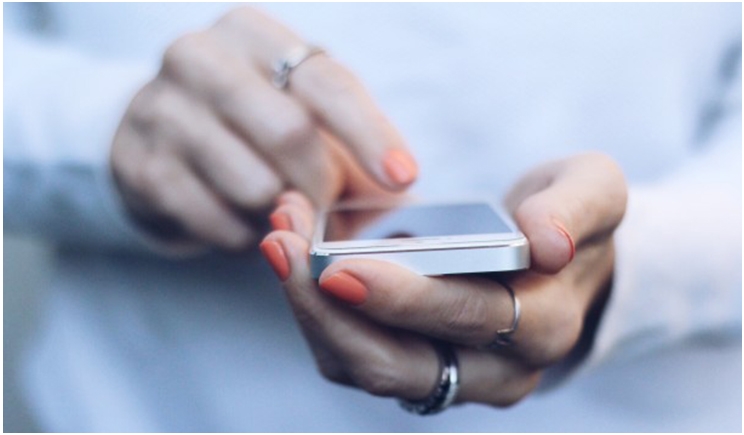
Your screen time is up 17% this week. You are averaging 6 hours and 14 minutes on your phone.
Wow. I stared at the number glaring back at me. Over six hours. Spent on my phone. That’s almost a full day’s work. To add insult to injury, my iPhone gave me a guilt-ridden breakdown of how I spent my time on my device. Over an hour was spent texting people, 47 minutes on social media, an hour on Scrabble, 30 minutes on Reddit, 25 minutes on e-mail…
As the list went on and on, I witnessed an entire breakdown of how I used my phone. And of course, in an epic ironic twist, I only spent five minutes using my phone for its intended purpose, talking to my husband. I can only describe this realization like that stepping-on-my-dog’s-tail type of panic followed by instant regret about something that was 100% unintentional.
If I’m being honest with myself, I had to face this for what it was—an addiction. Then, like most addicts, I began to justify my behavior:
“But I use my phone for work.”
“Playing Scrabble is something I do with my friends.”
“I have to check my e-mail or things will pile up between 8 pm and 6 am!”
“I just have to make this one photo collage to post on Facebook because Uncle Frank will love to see it!”
Smartphones and Cocaine
An article in Forbes says that brains on smartphones are the same as brains on cocaine. We get an instant high every time our screen lights up with a new notification due to to dopamine, the feel-good chemical that gets released every time we do something we enjoy, like eating a favorite meal or getting a hundred likes on our latest Instagram post. Dopamine reinforces and motivates behavior that makes us feel good. In turn, it can create addiction.
This is both startling and totally understandable. I did a little digging to find out more about the issue and was shocked to learn from Psychology Today that 66% of adults suffer from nomophobia, or the fear of being without their cell phone. First, I didn’t even know there was a term for this, and second, I actually have experienced this feeling! Not only that, I have experienced the sensation of anxiety when I turn my phone off in a meeting.
What happened next was completely unexpected. I started to feel a sense of excitement. This information felt like a hack into the time-space continuum. I had been feeling over-busy, worn out, run down, and like there weren’t enough hours in the day to get everything done (sound familiar?) and my phone just told me I have access to an additional six hours each day.
It was like opening a gift from the universe. Instead of spending an hour on social media, I could take that marketing course I enrolled in but couldn’t seem to find the time to go through. Rather than 30 minutes browsing dental message board forums, I could use that time to build Lego creations with my son. Instead of 25 minutes on e-mail in the evening, I could read a couple chapters from that book that’s been sitting on my shelf.
A New Beginning
I started slow. Breaking an addiction isn’t easy when you go cold turkey. I started using my screen time capture as a game. If I’m up 17% this week in usage, can I drop next week’s average by 20%? By 40%?
The best thing I’ve done is completely rewire my morning routine. I used to grab my phone before my eyes were even open. I’d immediately open my email (even though I’d checked before I went to sleep) to see if there was anything I “needed” to respond to at 6 am. Then I hopped on Facebook, checked my text messages, played a round of Scrabble, and checked my personal email. Then I’d slowly roll out of bed and get into the shower, groggily. My days didn’t start off on the right foot.
Now in the morning, rather than pick up my phone, I pick up a book. I read a chapter. Then I wake up the kids and snuggle with our cat. I head back into my room where I stretch for 10 minutes. I take a shower and get dressed. Only then do I pick up my phone to send my daily gratitude text to my gratitude partner, a good friend of mine. We don’t chit chat. We just send each other three things we are grateful for in that moment.
What I’ve learned through this exercise was to replace my non-active routine with behaviors that follow an “all systems online” process:
- Calm reflection and/or meditation: wake up the mind
- Physical movement: wake up the body
- Hydration (not caffeine): fuel the body
The number of days that I’m waking up “on the right side of the bed” have dramatically increased. Not only that, but I feel my overall physical and mental health have improved as well. Watching my screen time percentage drop was the motivation when I first started playing this game, but my overall happiness is in the driver’s seat now.
If you’re curious where I stand now, my screen time is down 78%, and my satisfaction and productivity are skyrocketing.
Ms. Robertson is the president and CMO of the Productive Dentist Academy, a national consulting company that’s helped thousands of dentists increase productivity and decrease stress since 2004 through business development, team building, and marketing. A multi-year honoree on the Inc. 5000 list, Productive Dentist Academy is recognized as one of America’s Fastest Growing Private companies. You can reach Ms. Robertson at Regan@ProductiveDentist.com or (800) 757-6077.
Related Articles
How to Form Strategic Partnerships That Work
How to Lead When Your Team Is Feuding
So You’ve Made a Major Mistake as a Practice Leader—Now What?











